-
 Bitcoin
Bitcoin $85,153.7008
0.19% -
 Ethereum
Ethereum $1,611.9471
0.74% -
 Tether USDt
Tether USDt $0.9999
0.00% -
 XRP
XRP $2.0824
0.07% -
 BNB
BNB $594.8487
0.44% -
 Solana
Solana $141.0161
2.06% -
 USDC
USDC $0.9999
0.00% -
 Dogecoin
Dogecoin $0.1592
0.25% -
 TRON
TRON $0.2430
0.70% -
 Cardano
Cardano $0.6310
0.14% -
 UNUS SED LEO
UNUS SED LEO $9.3462
-0.44% -
 Chainlink
Chainlink $13.0583
1.67% -
 Avalanche
Avalanche $19.9002
3.45% -
 Stellar
Stellar $0.2464
0.71% -
 Toncoin
Toncoin $3.0068
0.59% -
 Shiba Inu
Shiba Inu $0.0...01238
1.46% -
 Sui
Sui $2.1560
0.93% -
 Hedera
Hedera $0.1659
-0.64% -
 Bitcoin Cash
Bitcoin Cash $338.2209
0.30% -
 Polkadot
Polkadot $3.9317
5.47% -
 Hyperliquid
Hyperliquid $18.1514
1.10% -
 Litecoin
Litecoin $76.7521
0.57% -
 Bitget Token
Bitget Token $4.5877
3.38% -
 Dai
Dai $0.9999
0.00% -
 Ethena USDe
Ethena USDe $0.9992
-0.01% -
 Pi
Pi $0.6419
-0.41% -
 Monero
Monero $216.9663
1.85% -
 Uniswap
Uniswap $5.3190
1.42% -
 Pepe
Pepe $0.0...07480
2.77% -
 OKB
OKB $50.8919
0.00%
How to judge the security of an NFT trading platform?
Thoroughly research an NFT platform's security: check for independent audits, 2FA, secure wallet handling, insurance, transparency, and regulatory compliance before entrusting your digital assets.
Mar 12, 2025 at 12:25 pm
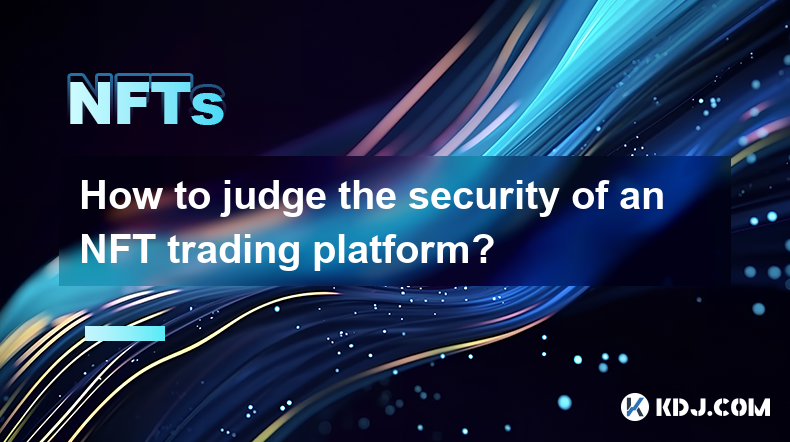
Key Points:
- Reputation and Track Record: Thoroughly research the platform's history, looking for reviews, news articles, and community discussions regarding security incidents.
- Security Audits: Check if the platform has undergone independent security audits by reputable firms. The results of these audits should be publicly available.
- Two-Factor Authentication (2FA): Verify that the platform mandates or strongly encourages the use of 2FA for all accounts.
- Wallet Security: Assess how the platform handles user wallets and private keys. Look for features like multi-signature wallets and secure storage solutions.
- Insurance and Compensation: Investigate whether the platform offers insurance or compensation schemes for users in the event of a security breach.
- Transparency and Communication: A secure platform will be transparent about its security measures and promptly address any security concerns.
- Regulatory Compliance: Check if the platform complies with relevant regulations and licensing requirements in its jurisdiction.
How to Judge the Security of an NFT Trading Platform?
Choosing a secure NFT trading platform is crucial to protect your valuable digital assets. Many platforms exist, each with varying levels of security. A thorough assessment is vital before entrusting your NFTs to any platform. Neglecting this could result in significant financial losses.
Reputation and Track Record: Before using any platform, research its reputation. Look for reviews and news articles. Are there reports of hacks, scams, or significant security breaches? Active community forums can provide valuable insights into user experiences and potential security concerns. A platform with a history of security incidents should be approached with caution.
Security Audits: Reputable NFT trading platforms regularly undergo independent security audits. These audits identify vulnerabilities and assess the platform's overall security posture. Look for publicly available reports from respected cybersecurity firms. The absence of such audits is a significant red flag.
Two-Factor Authentication (2FA): 2FA is a fundamental security measure that adds an extra layer of protection to your account. It requires a second verification method, such as a code from an authenticator app, in addition to your password. A platform that doesn't offer or strongly encourage 2FA is likely to have weaker security.
Wallet Security: The way a platform handles user wallets is critical. Ideally, the platform should use multi-signature wallets, requiring multiple approvals for transactions. This significantly reduces the risk of unauthorized access. Understand how the platform stores private keys and ensure they utilize secure storage solutions to prevent theft or loss.
Insurance and Compensation: While not all platforms offer this, insurance or compensation schemes provide an additional safety net. In the unfortunate event of a security breach leading to NFT theft, these schemes can partially or fully reimburse users for their losses. This shows a commitment to user security.
Transparency and Communication: A secure platform is transparent about its security measures. It openly communicates its security protocols and promptly addresses any reported vulnerabilities or security incidents. Lack of transparency should raise concerns about the platform's commitment to security.
Regulatory Compliance: The platform's adherence to relevant regulations and licensing requirements demonstrates a commitment to responsible operation. Check if the platform complies with applicable laws and regulations in its jurisdiction. This contributes to a more secure and trustworthy environment.
Smart Contract Audits: NFTs are often built on smart contracts. Independent audits of these contracts are essential to verify their security and functionality. Ensure the platform uses audited smart contracts to minimize the risk of vulnerabilities being exploited.
Customer Support: A responsive and helpful customer support team can be invaluable in addressing security concerns. Test the responsiveness and helpfulness of the customer support team before entrusting your valuable assets to the platform.
Community Involvement: Active participation in the community and a willingness to engage with users regarding security matters demonstrates a commitment to user safety. Look for evidence of community involvement and open communication channels.
Website Security: Check if the platform's website uses HTTPS (indicated by a padlock icon in the address bar). This encrypts communication between your browser and the platform, protecting your data from interception. Also, look for evidence of regular security updates and patches.
Data Encryption: Verify that the platform uses strong encryption to protect user data, both in transit and at rest. This protects sensitive information such as personal details and transaction records from unauthorized access.
Withdrawal Limits: While not directly related to security breaches, withdrawal limits can help mitigate the impact of a successful attack. Lower withdrawal limits can limit the potential losses in case of compromise.
Frequently Asked Questions:
Q: What happens if an NFT trading platform is hacked? A: The consequences vary greatly depending on the platform's security measures and the extent of the breach. Users may lose their NFTs, personal information, or both. The platform's response and any insurance or compensation schemes will influence the outcome.
Q: How can I protect myself from NFT scams on trading platforms? A: Be wary of phishing attempts, suspicious links, and unsolicited offers. Verify the legitimacy of the platform and the NFTs being offered. Only interact with official channels and avoid platforms with a poor reputation.
Q: Are all NFT trading platforms equally secure? A: No, NFT trading platforms vary significantly in their security measures. Some platforms prioritize security more than others, resulting in a wide range of security levels. Thorough research is crucial before using any platform.
Q: What is the role of smart contracts in NFT security? A: Smart contracts govern the functionality of NFTs. Vulnerabilities in these contracts can be exploited to steal or manipulate NFTs. Independent audits of smart contracts are essential to ensure their security.
Q: Can I recover my NFTs if they are stolen from a trading platform? A: Recovery depends on the platform's security measures and the nature of the theft. Some platforms may offer assistance in recovering stolen NFTs, while others may not. The platform's insurance or compensation schemes might also play a role.
Disclaimer:info@kdj.com
The information provided is not trading advice. kdj.com does not assume any responsibility for any investments made based on the information provided in this article. Cryptocurrencies are highly volatile and it is highly recommended that you invest with caution after thorough research!
If you believe that the content used on this website infringes your copyright, please contact us immediately (info@kdj.com) and we will delete it promptly.
- MoonPay CEO Ivan Soto-Wright Asks Congress to Keep State Regulators Involved in Stablecoin Regulation
- 2025-04-20 13:55:14
- Web3 AI Emerges as a Strong Contender, Outperforming Solana (SOL) and Cardano (ADA) by Delivering Impressive Returns and Enhanced Scam Protection
- 2025-04-20 13:55:14
- Telegram Fires Back, Exposing How French Authorities Only Recently Started Playing by EU Rules
- 2025-04-20 13:55:13
- Pi Network Releases Its Mainnet Migration Roadmap
- 2025-04-20 13:55:13
- A coin, which is going up for auction
- 2025-04-20 13:45:12
- $TRUMP coin has gained some momentum at the start of the long Easter weekend — but not for the right reasons.
- 2025-04-20 13:45:12
Related knowledge
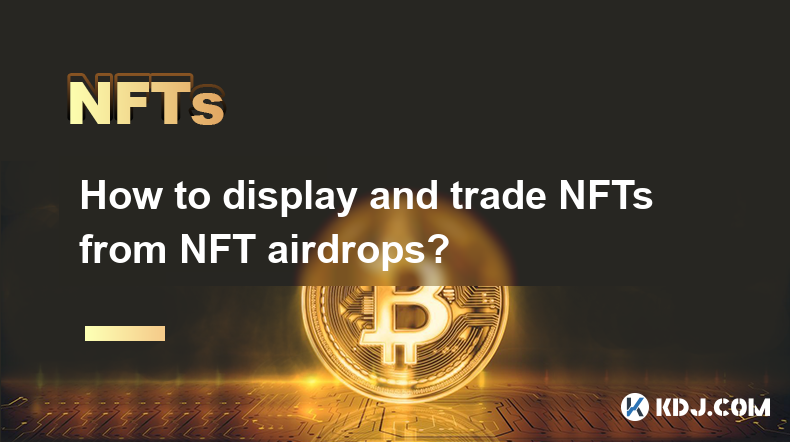
How to display and trade NFTs from NFT airdrops?
Apr 18,2025 at 04:42am
How to Display and Trade NFTs from NFT Airdrops? NFT airdrops have become a popular way for projects to distribute their tokens and engage with their community. If you've received NFTs through an airdrop, you might be wondering how to display and trade them. This article will guide you through the process step-by-step, ensuring you can showcase your NFT...
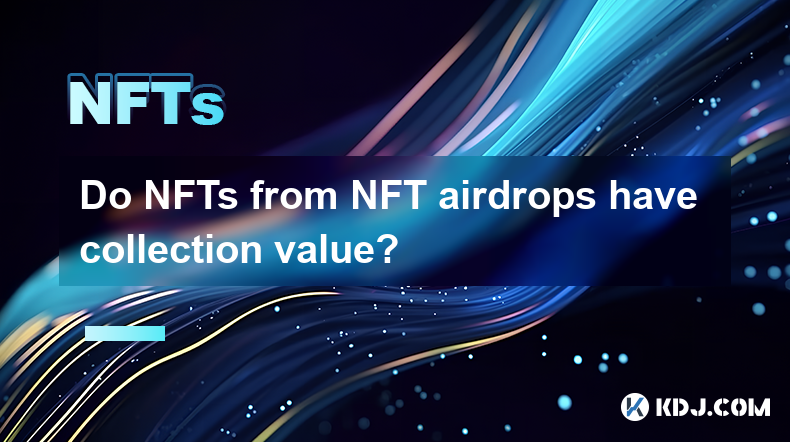
Do NFTs from NFT airdrops have collection value?
Apr 18,2025 at 11:49pm
NFTs, or non-fungible tokens, have become a significant part of the cryptocurrency ecosystem, and NFT airdrops are one way for projects to distribute these digital assets to their community. A common question that arises is whether NFTs received from airdrops have any collection value. To answer this question, we need to delve into various aspects of NF...
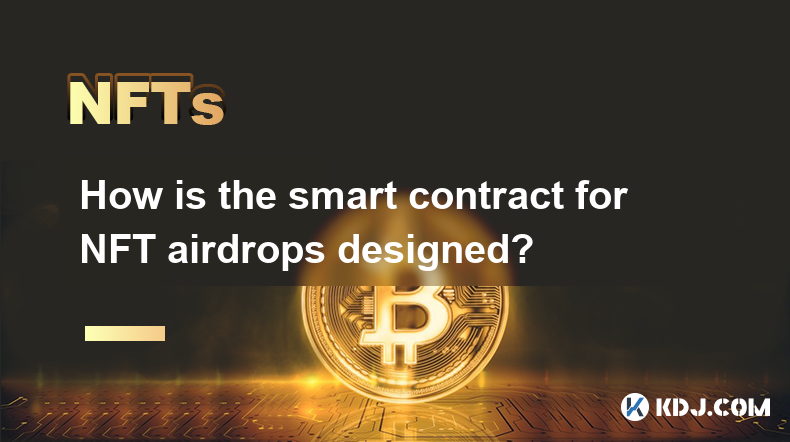
How is the smart contract for NFT airdrops designed?
Apr 18,2025 at 03:10am
The design of a smart contract for NFT airdrops is a complex process that requires careful consideration of various factors to ensure the airdrop is executed smoothly and securely. This article will delve into the intricacies of how such a smart contract is designed, focusing on key components, security measures, and the implementation process. Key Comp...
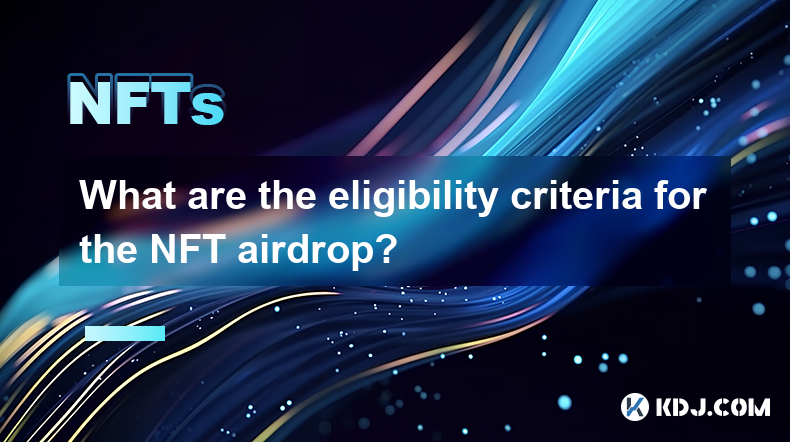
What are the eligibility criteria for the NFT airdrop?
Apr 17,2025 at 04:56pm
Understanding NFT AirdropsNFT airdrops are a popular method used by blockchain projects to distribute non-fungible tokens (NFTs) to their community members. These airdrops can serve various purposes, such as rewarding loyal users, promoting new projects, or increasing the visibility of existing ones. To participate in an NFT airdrop, individuals must me...

How to design a user authentication system for an NFT platform?
Apr 20,2025 at 01:49pm
Designing a user authentication system for an NFT (Non-Fungible Token) platform is crucial for ensuring security, user experience, and compliance with regulatory standards. This article will guide you through the process of creating a robust authentication system tailored for an NFT platform, covering key aspects such as user registration, login mechani...

How to protect the copyright of artworks on NFT platforms?
Apr 19,2025 at 06:28am
The rise of Non-Fungible Tokens (NFTs) has revolutionized the way digital art is created, bought, and sold. As artists increasingly turn to NFT platforms to showcase and monetize their work, protecting the copyright of these artworks becomes a crucial concern. This article explores various strategies and tools that artists can use to safeguard their int...

How to display and trade NFTs from NFT airdrops?
Apr 18,2025 at 04:42am
How to Display and Trade NFTs from NFT Airdrops? NFT airdrops have become a popular way for projects to distribute their tokens and engage with their community. If you've received NFTs through an airdrop, you might be wondering how to display and trade them. This article will guide you through the process step-by-step, ensuring you can showcase your NFT...

Do NFTs from NFT airdrops have collection value?
Apr 18,2025 at 11:49pm
NFTs, or non-fungible tokens, have become a significant part of the cryptocurrency ecosystem, and NFT airdrops are one way for projects to distribute these digital assets to their community. A common question that arises is whether NFTs received from airdrops have any collection value. To answer this question, we need to delve into various aspects of NF...

How is the smart contract for NFT airdrops designed?
Apr 18,2025 at 03:10am
The design of a smart contract for NFT airdrops is a complex process that requires careful consideration of various factors to ensure the airdrop is executed smoothly and securely. This article will delve into the intricacies of how such a smart contract is designed, focusing on key components, security measures, and the implementation process. Key Comp...

What are the eligibility criteria for the NFT airdrop?
Apr 17,2025 at 04:56pm
Understanding NFT AirdropsNFT airdrops are a popular method used by blockchain projects to distribute non-fungible tokens (NFTs) to their community members. These airdrops can serve various purposes, such as rewarding loyal users, promoting new projects, or increasing the visibility of existing ones. To participate in an NFT airdrop, individuals must me...

How to design a user authentication system for an NFT platform?
Apr 20,2025 at 01:49pm
Designing a user authentication system for an NFT (Non-Fungible Token) platform is crucial for ensuring security, user experience, and compliance with regulatory standards. This article will guide you through the process of creating a robust authentication system tailored for an NFT platform, covering key aspects such as user registration, login mechani...

How to protect the copyright of artworks on NFT platforms?
Apr 19,2025 at 06:28am
The rise of Non-Fungible Tokens (NFTs) has revolutionized the way digital art is created, bought, and sold. As artists increasingly turn to NFT platforms to showcase and monetize their work, protecting the copyright of these artworks becomes a crucial concern. This article explores various strategies and tools that artists can use to safeguard their int...
See all articles























































































